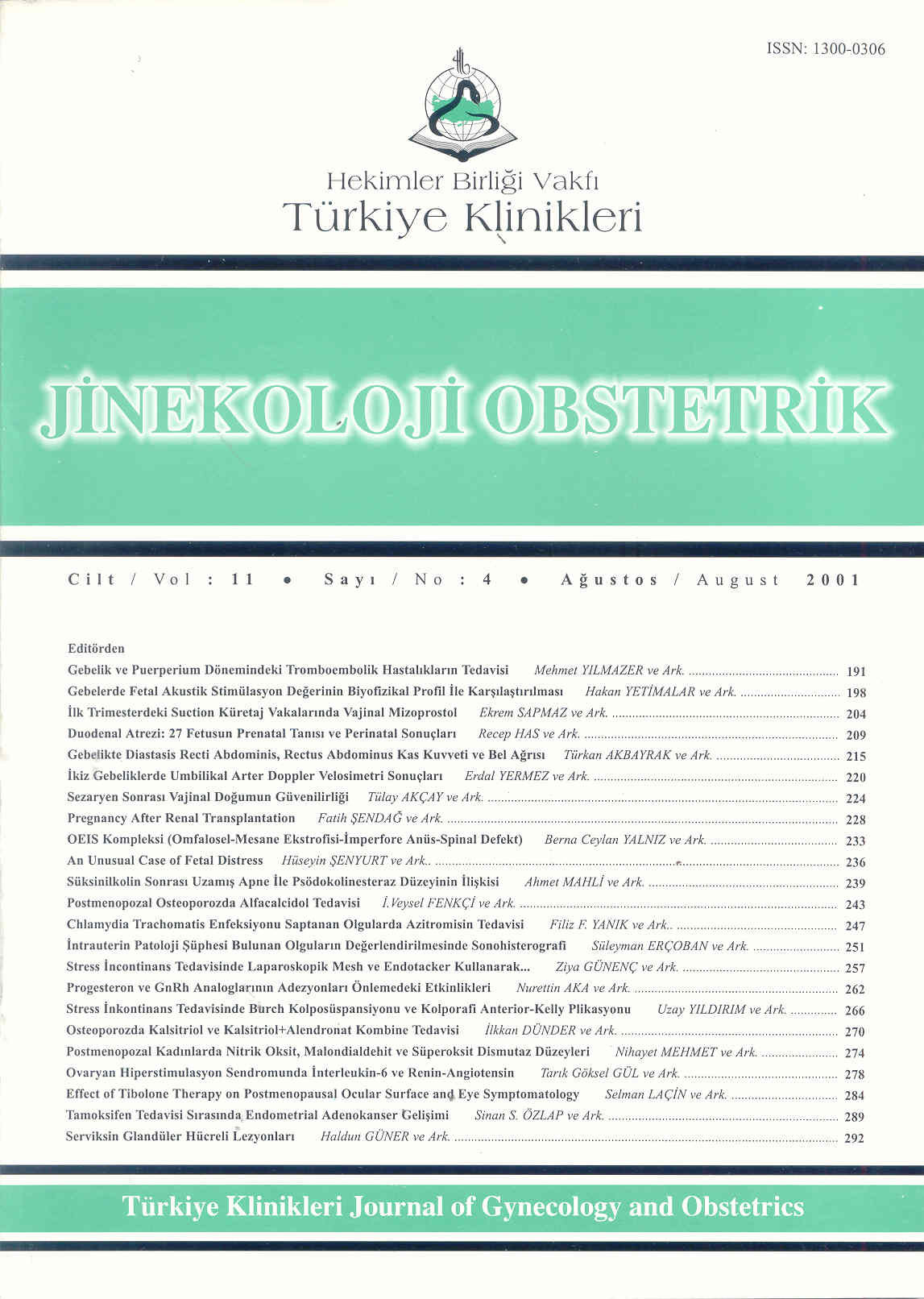Open Access
Peer Reviewed
ARTICLES
3208 Viewed1547 Downloaded
Effects Of Alfacalcidol Treatment On Bone Mineral Density And Calcium Metabolism In Postmenopausal Osteoporosis
Postmenopozal Osteoporozda Alfacalcidol Tedavisinin Kemik Mineral Yoğunluğu ve Kalsiyum Metabolizması Üzerine Etkisi
Turkiye Klinikleri J Gynecol Obst. 2001;11(4):243-6
Article Language: TR
Copyright Ⓒ 2025 by Türkiye Klinikleri. This is an open access article under the CC BY-NC-ND license (http://creativecommons.org/licenses/by-nc-nd/4.0/)
ÖZET
Amaç: Alfacalcidol [1a(OH) D3] tedavisinin postmenopozal osteoporozda kemik mineral yoğunluğu ve kalsiyum metabolizmasına etkilerini değerlendirmek. Çalışmanın Yapıldığı Yer: Dr.Zekai Tahir Burak Kadın ve Eğitim Hastanesi. Materyel ve Metod: Prospektif, randomize ve plasebo kontrollü çalışmada, bir yıl süreyle günde iki defa olmak üzere 0.25 mg alfacalcidol ile birlikte günde iki defa 500mg kalsiyum alan (tedavi grubu,n =75) ve günde iki defa olmak üzere plasebo ile günde iki defa 500mg kalsiyum alan (kontrol grubu,n =75) 150 osteoporotik kadın (ortalama yaş, 51.9 yıl) araştırmaya alındı. Çalışmanın başında ve sonunda, dual enerji X-ray absorpsiyometri ile lumbar (L2-L4), femur boynu, total kemik mineral yoğunlukları (KMY) belirlendi ve total alkalen fosfataz (ALP), serum kalsiyum, fosfor, kreatinin ve idrar kalsiyum seviyeleri ölçüldü. Bulgular: KMY alfacalcidol tedavisiyle femur boynunda %0.07, L2-L4te %0.09 ve totalde %0.08 arttı ve plasebo ile femur boynunda %0.05, L2-L4te %0.06 ve totalde %0.07 azaldı (Her biri için, p<0.05). Tedavi grubunda serum kalsiyum (%3.26), fosfor (%34.37) ve total ALPın (%3.26) hafif bir yükselişi gözlendi. Serum kreatinin ve idrar kalsiyumun seviyelerinde değişiklik yoktu. Sonuç: Postmenopozal osteoporozdan yakınan kadınlarda alfacalcidol tedavisi ileri kemik kayıplarını önleyebilir. Hiperkalsemi ve hiperfosfatemi tedavi süresince risk faktörü olarak göz önünde bulundurulmalıdır.
Amaç: Alfacalcidol [1a(OH) D3] tedavisinin postmenopozal osteoporozda kemik mineral yoğunluğu ve kalsiyum metabolizmasına etkilerini değerlendirmek. Çalışmanın Yapıldığı Yer: Dr.Zekai Tahir Burak Kadın ve Eğitim Hastanesi. Materyel ve Metod: Prospektif, randomize ve plasebo kontrollü çalışmada, bir yıl süreyle günde iki defa olmak üzere 0.25 mg alfacalcidol ile birlikte günde iki defa 500mg kalsiyum alan (tedavi grubu,n =75) ve günde iki defa olmak üzere plasebo ile günde iki defa 500mg kalsiyum alan (kontrol grubu,n =75) 150 osteoporotik kadın (ortalama yaş, 51.9 yıl) araştırmaya alındı. Çalışmanın başında ve sonunda, dual enerji X-ray absorpsiyometri ile lumbar (L2-L4), femur boynu, total kemik mineral yoğunlukları (KMY) belirlendi ve total alkalen fosfataz (ALP), serum kalsiyum, fosfor, kreatinin ve idrar kalsiyum seviyeleri ölçüldü. Bulgular: KMY alfacalcidol tedavisiyle femur boynunda %0.07, L2-L4te %0.09 ve totalde %0.08 arttı ve plasebo ile femur boynunda %0.05, L2-L4te %0.06 ve totalde %0.07 azaldı (Her biri için, p<0.05). Tedavi grubunda serum kalsiyum (%3.26), fosfor (%34.37) ve total ALPın (%3.26) hafif bir yükselişi gözlendi. Serum kreatinin ve idrar kalsiyumun seviyelerinde değişiklik yoktu. Sonuç: Postmenopozal osteoporozdan yakınan kadınlarda alfacalcidol tedavisi ileri kemik kayıplarını önleyebilir. Hiperkalsemi ve hiperfosfatemi tedavi süresince risk faktörü olarak göz önünde bulundurulmalıdır.
ANAHTAR KELİMELER: Alfacalcidol, Postmenopozal osteoporozis, Kalsiyum
ABSTRACT
Objective: To evaluate the effects of Alfacalcidol [1a(OH) D3] treatment on bone mineral density and calcium metabolism in postmenopausal osteoporosis. Institution: Dr. Zekai Tahir Burak Woman and Education Hospital. Materials and Methods: In a prospective, randomized, placebo-controlled study, 150 osteoporotic postmenopausal women (mean age, 51.9 years) were scheduled to receive either alfacalcidol 0.25 mg twice daily together with calcium 500 mg twice daily (treatment group, n = 75) or placebo twice daily with calcium 500 mg twice daily (control group, n = 75) for a year. At onset and end of study, lumbar (L2-L4), femoral neck, total bone mineral density (BMD) were determined by dual energy X-ray absorptiometry and total alkaline phosphatase (ALP), serum calcium, phosphorus, creatinine and urine calcium levels were measured. Results: BMD increased 0.07% at femoral neck, 0.09% at L2-L4 and 0.08% at total with alfacalcidol treatment and decreased 0.05% at femoral neck, 0.06% at L2-L4 and 0.07% at total with plasebo (for each one, p<0.05). Mild elevations of serum calcium (3.26%), phosphorus (34.37%) and total ALP (3.26%) were observed in treatment group. There were no changes in serum creatinine and urine calcium levels. Conclusion: Alfacalcidol treatment may prevent further bone loss in women suffering from postmenopausal osteoporosis. Hypercalcemia and hyperphosphatemia must be considered as risk factors during the treatment.
Objective: To evaluate the effects of Alfacalcidol [1a(OH) D3] treatment on bone mineral density and calcium metabolism in postmenopausal osteoporosis. Institution: Dr. Zekai Tahir Burak Woman and Education Hospital. Materials and Methods: In a prospective, randomized, placebo-controlled study, 150 osteoporotic postmenopausal women (mean age, 51.9 years) were scheduled to receive either alfacalcidol 0.25 mg twice daily together with calcium 500 mg twice daily (treatment group, n = 75) or placebo twice daily with calcium 500 mg twice daily (control group, n = 75) for a year. At onset and end of study, lumbar (L2-L4), femoral neck, total bone mineral density (BMD) were determined by dual energy X-ray absorptiometry and total alkaline phosphatase (ALP), serum calcium, phosphorus, creatinine and urine calcium levels were measured. Results: BMD increased 0.07% at femoral neck, 0.09% at L2-L4 and 0.08% at total with alfacalcidol treatment and decreased 0.05% at femoral neck, 0.06% at L2-L4 and 0.07% at total with plasebo (for each one, p<0.05). Mild elevations of serum calcium (3.26%), phosphorus (34.37%) and total ALP (3.26%) were observed in treatment group. There were no changes in serum creatinine and urine calcium levels. Conclusion: Alfacalcidol treatment may prevent further bone loss in women suffering from postmenopausal osteoporosis. Hypercalcemia and hyperphosphatemia must be considered as risk factors during the treatment.
MENU
POPULAR ARTICLES
MOST DOWNLOADED ARTICLES





This journal is licensed under a Creative Commons Attribution-NonCommercial-NoDerivatives 4.0 International License.










